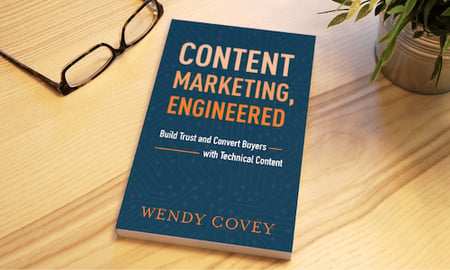4 min read
Why Engineering Companies Should Integrate HubSpot and Salesforce
Kara Moon
:
6/11/24 10:00 AM
Imagine this: you have a powerful engine under the hood of your car (Salesforce), but the dashboard (your marketing automation platform) is clunky and confusing. You know your car is capable of amazing things, but you can't quite take advantage of all its features.
Sound familiar? Is your current martech stack hindering your progress?

Many of the clients we work with leverage Salesforce as their customer relationship management (CRM) system, and in turn, find themselves frustrated by the complexity of Salesforce’s marketing tools like Account Engagement (formerly Pardot) or Marketing Cloud. These tools are powerful – perhaps too powerful for engineering companies seeking a more user-friendly experience. While feature-rich, they often require significant technical expertise and resources to implement and manage effectively.
This complexity often leads to:
- Disjointed Marketing Efforts: Fragmented tools make it difficult to create a cohesive marketing strategy and track campaign performance effectively.
- Reduced Team Productivity: Steep learning curves for complex marketing automation tools can hinder team efficiency and stifle innovation.
- Limited Marketing ROI: The time and resources spent wrestling with complex tools can detract from strategic marketing initiatives.
Here's the good news: there's a better way.
Enter HubSpot - a user-friendly all-in-one marketing platform that seamlessly integrates with your existing Salesforce CRM.
In this article, we’ll explore the advantages of this integration and guide you through the preparation process to ensure a smooth and successful implementation.
It’s also worth noting that while this article focuses solely on integrating HubSpot and Salesforce, the same advantages and preparation apply to other CRM integrations, including Microsoft Dynamics 365 and Pipedrive.
Understanding Your Systems
Before we dive into the integration advantages, it’s important to understand the distinct differences between the two platforms. Salesforce and HubSpot are industry leaders, but they excel in different areas:
- Salesforce: Renowned for its robust CRM capabilities, Salesforce excels at managing complex sales pipelines, forecasting, and reporting. It allows for deep customization, letting you tailor the platform to your specific engineering sales process.
- HubSpot: HubSpot shines in user-friendliness and integrated marketing tools. Its intuitive interface makes it easy for marketing teams to create campaigns, manage leads, and nurture relationships. HubSpot also boasts strong content management features, social media marketing tools, and built-in analytics to measure marketing ROI.
Differences in Terminology
Salesforce and HubSpot use different terminology for core data objects. Understanding these differences is crucial for seamless integration:
- Salesforce: In Salesforce, “leads” represent prospects, while "contacts" represent qualified leads or existing customers. “Opportunities” represent potential sales deals.
- HubSpot: HubSpot uses the term "contact" for all leads and customers. “Deals” represent potential sales opportunities.

6 Advantages to Integrating HubSpot and Salesforce
By integrating HubSpot and Salesforce, your marketing and sales teams can work together like a well-oiled machine. Here's what this winning combination can do for your engineering company:
- Unified Lead Management: Say goodbye to siloed data! The integration ensures all lead information – website visits, email opens, form submissions – flows seamlessly between platforms. This empowers your sales team to see the complete buyer's journey and tailor their outreach accordingly.
- Enhanced Lead Nurturing: HubSpot's user-friendly marketing tools allow you to create targeted campaigns that nurture leads with relevant content. Imagine nurturing leads with educational white papers, case studies showcasing successful projects, or even personalized webinars.
- Improved Lead Scoring: Leverage HubSpot's lead scoring to identify high-value prospects. By combining website behavior and email engagement with Salesforce data, you can prioritize leads who are most likely to convert, ensuring your sales team focuses on the best opportunities.
- Measurable Marketing ROI: Track the effectiveness of your marketing efforts with HubSpot's built-in analytics. See which content resonates most, identify high-performing campaigns, and gain valuable insights to optimize your marketing strategy for better ROI.
- Simplified User Experience: HubSpot's user-friendly interface makes it easy for your marketing team to create campaigns, manage leads, and analyze data, even without extensive technical expertise. This frees up valuable time and resources for creative marketing initiatives.
- Scalability for Growth: As your engineering company grows, the combined power of HubSpot and Salesforce scales with you. Both can be customized to accommodate increasingly complex marketing and sales processes, and both offer advanced functionality for enterprises.
The integration fosters a data-driven approach, improves communication across teams, and ultimately drives growth for your company.
6 Steps to Prepare for Your Integration
Having explored the advantages, you're ready to harness the power of a HubSpot Salesforce integration. Here's what you need to consider for a smooth implementation:
- Define Your Integration Goals: Clearly outline what you want to achieve with the integration. Is it improving lead nurturing, boosting sales team productivity, or gaining deeper customer insights? Articulating these goals will guide your configuration decisions.
- Assemble Your Integration Team: A successful integration requires a dedicated team to manage the process. This team should include representatives from both your marketing and sales departments, as well as an IT specialist with experience in CRM and marketing automation platforms. The marketing team will provide input on the specific marketing data fields for synchronization, while the sales team will ensure alignment with their lead qualification process. The IT specialist will oversee the technical aspects of the integration and troubleshoot any potential issues.
- Determine Field Mapping: Both HubSpot and Salesforce have their own object structures and data fields. Identify the critical data points you want to sync between the platforms. This could include contact information, company details, website activity data, and deal stages. Standardize field names and data formats across both platforms to ensure accurate syncing and avoid data inconsistencies or errors.
- Clean Up Your Data: Before syncing your data between platforms, it's crucial to ensure its accuracy and consistency. This involves cleaning up duplicate records, standardizing data formats (e.g., date formats, state abbreviations), and eliminating any irrelevant or outdated information. Clean data leads to a smoother integration and more reliable insights from both platforms.
- Develop a Testing Plan: Once the integration is configured, thoroughly test the data syncing process. Create test scenarios to ensure data flows accurately between HubSpot and Salesforce across different object types (e.g., Contacts, Deals). This helps identify and address any potential mapping errors or data inconsistencies before going live.
- Consider a Change Management Plan: Integrating new tools can impact user workflows. Develop a communication plan to keep your marketing and sales teams informed throughout the process. Provide training on how to leverage the integrated platform and address any concerns your team may have. A well-defined change management plan will help ensure user adoption and maximize the benefits of the integration.
The next step is the actual integration process, which involves setting up the connection between the two systems and configuring sync settings. By following these preparation steps, you'll be well on your way to a successful integration that encourages marketing and sales alignment.
A Growth Engine for Engineering Companies
A HubSpot-Salesforce integration presents a powerful opportunity for engineering companies to streamline their marketing and sales processes.
But remember, a successful integration hinges on proper planning, data mapping, and ongoing monitoring. By following the outlined steps and investing in user training, you can unlock the true potential of this dynamic duo. With a well-integrated HubSpot-Salesforce system in place, your engineering company will be well-equipped to attract, nurture, and convert high-value leads, propelling your business toward sustainable growth.
Learn how TREW sets you up for success with HubSpot onboarding and integration services.
TREW is a marketing agency dedicated to reaching engineering and technical audiences through a range of marketing initiatives. Contact us today to learn more about the services we offer.
SUBSCRIBE TO OUR BLOG FOR THE LATEST UPDATES
Kara Moon
Kara Moon joined the TREW team in May 2022 with experience in marketing automation utilizing Hubspot and Salesforce, as well as website development and sales enablement. Prior to joining the team at TREW, she worked primarily in the B2B and B2C banking and insurance industries.
About TREW Marketing
TREW Marketing is a strategy-first content marketing agency serving B2B companies that target highly technical buyers. With deep experience in the design, embedded, measurement and automation, and software industries, TREW Marketing provides branding, marketing strategy, content development, and digital marketing services to help customers efficiently and effectively achieve business goals.





